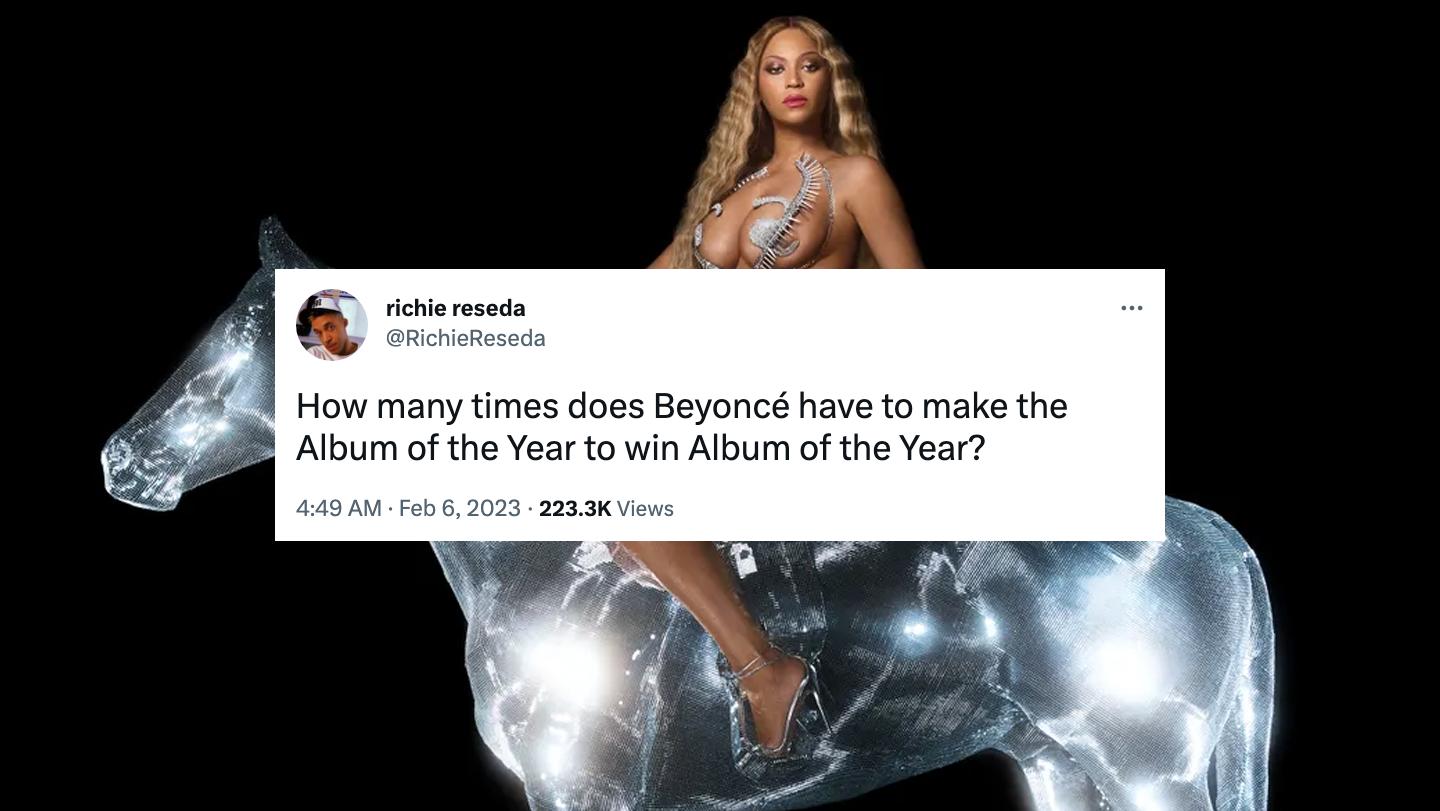Beyoncé made history last night, becoming the artist with the highest number of Grammy Awards in the ceremony’s 65-year history. She now has 32 wins and 88 nominations, claiming the record from classical music conductor Georg Solti who died in 1997. (Beyoncé, for reference, didn’t get her first nomination until three years after his passing.) Despite her prolific run over the past 23 years, and despite the fact she’s had the firmest grip on music even when she’s not releasing records, only one of these wins is for a song in one of the Grammys so-called “Big Four”: Album of the Year, Song of the Year (which she won in 2011 for “Single Ladies”), Record of the Year and New Artist of the Year.
Last night, the bookies widely expected that two decade-long snub for album recognition to finally be broken. Having earned her first nomination in the Big Four for “Say My Name” with Destiny’s Child in 2001, the general consensus was that she’d finally win big with Renaissance: her monumental, genre-hopping masterpiece that broke streaming records and wound up on the top of pretty much every publication’s Best Albums of 2022 list, including Pitchfork, Rolling Stone, the New York Times and The Guardian. Alas, it wasn’t meant to be: Renaissance was surprisingly beaten by Harry Styles’ third record, Harry’s House. “This doesn’t happen to people like me very often,” he said, as he stood on stage collecting the prize. This, of course, prompted a significant backlash, made worse by the context in which it was said. Of course, Harry has had some odds stacked against him — it’s hard for a former boyband member formed on a reality television show, who grew up in the north of England with no nepotistic industry connections to be taken seriously musically — but in the grand scheme of things, the white man’s journey in music has been considerably less arduous than a Black woman’s, even when that Black woman is Beyoncé.
It might seem contradictory to suggest that the woman with the most prizes in Grammy history can genuinely resonate with Harry’s statement, but it’s true: Beyoncé doesn’t know what it’s like to win one of the most prestigious prizes in musical history. She’s come close — four times, in fact — and been sidelined every time. In 2010, I Am… Sasha Fierce lost Album of the Year to Taylor Swift’s Fearless. In 2015, her self-titled knockout lost to Morning Phase by Beck. And then Lemonade lost to Adele’s 25. “I can’t possibly accept this award, and I’m very humbled and very grateful and gracious, but my life is Beyoncé,” Adele said when she took to the stage to pick up that prize. “The Lemonade album, Beyoncé, was so monumental.” Beyoncé looked on, teary-eyed, from the audience.
While some artists’ careers are single-handedly defined by these wins, experiencing bursts of popularity in the wake of a win, the voting body often makes such bad decisions that it can be hard to affirm their legitimacy. In 2013, for example, Mumford and Sons’ Babel (us neither) won the Album of the Year prize over Frank Ocean’s Channel Orange. The following year, Macklemore & Ryan Lewis famously won the Rap Album of the Year prize over Kendrick Lamar, Kanye West, Jay-Z and Drake. Harry Styles deserves a shedload of Grammys — give him everything for “As It Was”; heck, he should have won Album of the Year for Fine Line — but to look at a category of records and see Renaissance there, and not think it’s worthy of the Album of the Year prize, is their most rogue decision since, well, snubbing Lemonade.
Of course, this is not to say that the fault lies with the artists who did win, but more so how the voting body of the Grammys consistently finds ways to sideline a legend. It feels like a form of strange, inexplicable torture for Beyoncé: the recognition she gets comes in the below-the-line categories: RnB, Dance/Electronica, Rap. But despite the fact that her records are regularly cited as defining albums of their generation, changing the industry’s release strategies, and politically vital, the voting body can’t seem to give her the respect she deserves. Maybe it’s a case of those with the power to vote predicting Beyoncé will coast to the top spot as the obvious option, so placing their vote behind someone considered the underdog, but her lack of a major win for an album is still jarring, and deserves to have been rectified by now. It calls into question the make-up of the Grammys voters (such information isn’t available publicly) and whether or not that plays a part in the decisions made to constantly snub her.
If there is a silver lining to this, it’s that Beyoncé remains bigger than the Grammys in a sense: you may struggle to remember the records that have beaten her in a few year’s time. Gold statues are one thing, but her reputation, her legacy, remains unparalleled. With each new opportunity the voting body takes to snub a Black artist worthy of high praise, the legitimacy and glory that stems from the famous golden gramophone gets weaker.


